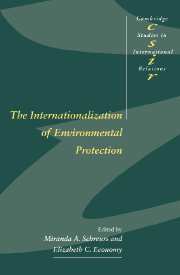Book contents
- Frontmatter
- Contents
- List of contributors
- Preface
- 1 Domestic and international linkages in environmental politics
- 2 Chinese policy-making and global climate change: two-front diplomacy and the international community
- 3 The domestic politics of global biodiversity protection in the United Kingdom and the United States
- 4 Domestic and international linkages in global environmental politics: a case-study of the Montreal Protocol
- 5 The internationalization of environmental protection in the USSR and its successor states
- 6 Domestic institutions and international environmental agendas in Japan and Germany
- 7 Zimbabwe and CITES: illustrating the reciprocal relationship between the state and the international regime
- 8 The European Union: bridging domestic and international environmental policy-making
- Index
- CAMBRIDGE STUDIES IN INTERNATIONAL RELATIONS
6 - Domestic institutions and international environmental agendas in Japan and Germany
Published online by Cambridge University Press: 08 March 2010
- Frontmatter
- Contents
- List of contributors
- Preface
- 1 Domestic and international linkages in environmental politics
- 2 Chinese policy-making and global climate change: two-front diplomacy and the international community
- 3 The domestic politics of global biodiversity protection in the United Kingdom and the United States
- 4 Domestic and international linkages in global environmental politics: a case-study of the Montreal Protocol
- 5 The internationalization of environmental protection in the USSR and its successor states
- 6 Domestic institutions and international environmental agendas in Japan and Germany
- 7 Zimbabwe and CITES: illustrating the reciprocal relationship between the state and the international regime
- 8 The European Union: bridging domestic and international environmental policy-making
- Index
- CAMBRIDGE STUDIES IN INTERNATIONAL RELATIONS
Summary
As regional leaders and economic heavyweights, Japan and Germany are important actors in global environmental politics. Yet Japan and Germany responded quite differently to the emergence of global environmental risks in the 1980s. Whereas Germany was relatively proactive in response to the emergence of global atmospheric pollution problems, Japan was relatively reactive. New ideas about international environmental problems reached the German policy agenda more quickly than they did the Japanese. Acid rain, for example, was an issue on the German policy agenda in the early 1980s, yet it did not surface as a political concern in Japan until the end of the 1980s, even though it was a scientific concern before this time. In the mid-1980s, Germany emerged as a leader within the European Community (EC) pushing for the establishment of international regulations on ozone-depleting substances. In contrast, there was almost no mention of stratospheric ozone depletion in Japan prior to the fall of 1987, just months before states met to draw up the Montreal Protocol on Substances that Deplete the Ozone Layer. Similarly, in the case of global warming, Germany was one of the first countries to propose the establishment of international targets for the reduction of greenhouse gas emissions and announced an ambitious domestic target as a starting point. The pillar of Germany's climate change policy was its target to reduce CO2 emissions by 25 percent of 1987 levels by 2005. Japan, on the other hand, initially joined the United States, Russia, and China in objecting to an international target, and instead called for more research into climate change. Domestically, there was very little public, scientific, or political pressure for action.
- Type
- Chapter
- Information
- The Internationalization of Environmental Protection , pp. 134 - 161Publisher: Cambridge University PressPrint publication year: 1997
- 9
- Cited by

